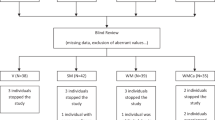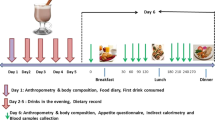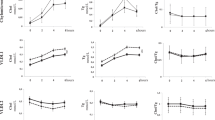Abstract
Objective:
To determine the impact of intake occasion (with or without a meal), and product fat level on the cholesterol-lowering efficacy of a plant sterol (PS)-enriched (3 g/day) single-dose yoghurt drink.
Design:
Double-blind, randomized, placebo-controlled, parallel study with a 4 weeks run-in and 4 weeks intervention period.
Setting:
Subjects recruited from the general community.
Subjects:
A total of 184 moderate hypercholesterolaemic subjects (81 men and 103 women) (age 57±2 years) completed the study.
Interventions:
The study product was a 100-g single-dose yoghurt drink with or without added PS in the form of PS esters. The subjects were randomly assigned to one of five 4-week treatments: (i) drink A (0.1% dairy fat, 2.2% total fat) with a meal, (ii) drink A without a meal, (iii) drink B (1.5% dairy fat, 3.3% total fat) with a meal, (iv) drink B without a meal and (v) placebo drink with a meal.
Results:
LDL-cholesterol (LDL-C) was significantly lowered when the single-dose drink was taken with a meal independent of its fat content (drink A: −9.5% (P<0.001, 95% CI: −13.8 to −5.2); drink B: −9.3% (P<0.001, 95% CI: −13.7 to −4.9)) as compared to placebo. When consumed without a meal, LDL-C was also significantly decreased (drink A: −5.1% (P<0.05, 95% CI: −9.4 to −0.8); drink B: −6.9% (P<0.01, 95% CI: −11.3 to −2.5) as compared to placebo, however the effect was significantly smaller as compared to the intake with a meal.
Conclusion:
These results indicate that a PS-ester-enriched single-dose yoghurt drink effectively reduces LDL-C irrespective of the fat content of the product. A substantially larger decrease in serum cholesterol concentration was achieved when the single-dose drink was consumed with a meal emphasizing the importance of the intake occasion for optimal cholesterol-lowering efficacy.
Sponsorship:
Unilever Research and Development, Vlaardingen, The Netherlands.
This is a preview of subscription content, access via your institution
Access options
Subscribe to this journal
Receive 12 print issues and online access
$259.00 per year
only $21.58 per issue
Buy this article
- Purchase on Springer Link
- Instant access to full article PDF
Prices may be subject to local taxes which are calculated during checkout


Similar content being viewed by others
References
Beer MU, Pritchard PH, Olesen M, Black R (2001). Free phytosterols from tall oil delivered in low fat food matrix successfully lowers plasma cholesterol. Ann Nutr Metab 45 (Suppl 1), 99.
Cleghorn CL, Skeaff CM, Mann J, Chisholm A (2003). Plant sterol-enriched spread enhances the cholesterol-lowering potential of a fat-reduced diet. Eur J Clin Nutr 57, 170–176.
Clifton PM, Noakes M, Sullivan D, Erichsen N, Ross D, Annison G et al. (2004). Cholesterol-lowering effects of plant sterol esters differ in milk, yoghurt, bread and cereal. Eur J Clin Nutr 58, 503–509.
Daugherty AL, Mrsny RJ (1999). Transcellular uptake mechanisms of the intestinal epithelial barrier Part one. Pharm Sci Technol Today 4, 144–151.
De Koning S, van der Meer B, Alkema G, Janssen HG, Brinkman UA (2001). Automated determination of fatty acid methyl ester and cis/trans methyl ester composition of fats and oils. J Chromatogr A 922, 391–397.
Denke MA (1995). Lack of efficacy of low-dose sitostanol therapy as an adjunct to a cholesterol-lowering diet in men with moderate hypercholesterolemia. Am J Clin Nutr 61, 392–396.
Devaraj S, Jialal I, Vega-Lopez S (2004). Plant sterol-fortified orange juice effectively lowers cholesterol levels in mildly hypercholesterolemic healthy individuals. Arterioscler Thromb Vasc Biol 24, e25–e28.
Duchateau GSMJE, Bauer-Plank CG, Louter AJH, van der Ham M, Boerma JA, van Rooijen JJM et al. (2002). Fast and accurate method for total 4-desmethyl sterol(s) content in spreads, fat blends and raw materials. J Am Oil Chem Soc 79, 273.
Evans DF, Wennerström H (eds) (1994). Micellar solution play a key role in many industrial and biological processes. In: The Colloidal Domain, Where Physics, Chemistry, Biology and Technology Meet. VCH Publishers Inc: New York, pp 171.
Food and Drug Administration (FDA) (2000). Food labelling: health claims; plant sterol/stanol esters and coronary heart disease. Food Drug Admin Fed Reg 65, 54686–54739.
Hayes KC, Pronczuk A, Perlman D (2004). Nonesterified phytosterols dissolved and recrystallized in oil reduce plasma cholesterol in gerbils and humans. J Nutr 134, 1395–1399.
Hayes KC, Pronczuk A, Wijendran V, Beer M (2002). Free phytosterols effectively reduce plasma and liver cholesterol in gerbils fed cholesterol. J Nutr 132, 1983–1988.
Hendriks HF, Brink EJ, Meijer GW, Princen HM, Ntanios FY (2003). Safety of long-term consumption of plant sterol esters-enriched spread. Eur J Clin Nutr 57, 681–692.
Hendriks HF, Weststrate JA, van Vliet T, Meijer GW (1999). Spreads enriched with three different levels of vegetable oil sterols and the degree of cholesterol lowering in normocholesterolaemic and mildly hypercholesterolaemic subjects. Eur J Clin Nutr 53, 319–327.
Hopman WP, Jansen JB, Lamers CB (1985). Comparative study of the effect of equal amounts of fat. Protein and starch on plasma cholecystokinin in man. Scand J Gastroenterol 20, 843–847.
Jones PJ, Vanstone CA, Raeini-Sarjaz M, St-Onge MP (2003). Phytosterols in low- and nonfat beverages as part of a controlled diet fail to lower plasma lipid levels. J Lipid Res 44, 1713–1719.
Katan MB, Grundy SM, Jones P, Law M, Miettinen T, Paoletti R, Stresa Workshop Participants (2003). Efficacy and safety of plant stanols and sterols in the management of blood cholesterol levels. Mayo Clin Proc 78, 965–978.
Maes BD, Hiele MI, Guypens BJ, Ghoos YF, Rutgeerts PJ (1998). Gastrich emptying of a liquid, solid and oil phase of a meal in normal volunteers and patients with Bilroth II gastrojejunostomy. Eur J Clin Invest 28, 197–204.
Maki KC, Davidson MH, Umporowicz DM, Schaefer EJ, Dicklin MR, Ingram KA et al. (2001). Lipid responses to plant-sterol-enriched reduced-fat spreads incorporated into a National Cholesterol Education Program Step I diet. Am J Clin Nutr 74, 33–43.
Matvienko OA, Lewis DS, Swanson M, Arndt B, Rainwater DL, Stewart J et al. (2002). A single daily dose of soybean phytosterols in ground beef decreases serum TC and LDL cholesterol in young, mildly hypercholesterolemic men. Am J Clin Nutr 76, 57–64.
Mel’nikov SM, Seijen ten Hoorn JW, Eijkelenboom AP (2004). Effect of phytosterols and phytostanols on the solubilization of cholesterol by dietary mixed micelles: an in vitro study. Chem Phys Lipids 127, 121–141.
Mensink RP, Ebbing S, Lindhout M, Plat J, van Heugten MM (2002). Effects of plant stanol esters supplied in low-fat yoghurt on serum lipids and lipoproteins, non-cholesterol sterols and fat soluble antioxidant concentrations. Atherosclerosis 160, 205–213.
Miettinen TA, Puska P, Gylling H, Vanhanen H, Vartiainen E (1995). Reduction of serum cholesterol with sitostanol-ester margarine in a mildly hypercholesterolemic population. N Engl J Med 333, 1308–1312.
Nestel P, Cehun M, Pomeroy S, Abbey M, Weldon G (2001). Cholesterol-lowering effects of plant sterol esters and non-esterified stanols in margarine, butter and low-fat foods. Eur J Clin Nutr 55, 1084–1090.
Noakes M, Clifton PM, Doornbos AM, Trautwein EA (2005). Plant sterol ester-enriched milk and yoghurt effectively reduce serum cholesterol in modestly hypercholesterolemic subjects. Eur J Nutr 44, 214–222 [Epub 2004 Aug 17].
Ntanios FY, Homma Y, Ushiro S (2002). A spread enriched with plant sterol-esters lowers blood cholesterol and lipoproteins without affecting vitamins A and E in normal and hypercholesterolemic Japanese men and women. J Nutr 132, 3650–3655.
Ostlund RE (2002). Cholesterol absorption. Curr Opin Gastroent 18, 254–258.
Pineda JA, Ranedo MJC, Anda JA, Terreros SF (2005). Eficacia hipocolesterolemiante de un yogur que contiene ésteres de estanol vegetal. Rev Clin Espaòola 205, 63–66.
Plat J, van Onselen EN, van Heugten MM, Mensink RP (2000). Effects on serum lipids, lipoproteins and fat soluble antioxidant concentrations of consumption frequency of margarines and shortenings enriched with plant stanol esters. Eur J Clin Nutr 54, 671–677.
Ribaya-Mercado JD (2002). Influence of dietary fat on β-carotene absorption and bioconversion into vitamin A. Nutr Rev 60, 104–110.
Rigler MW, Honkanen RE, Patton JS (1986). Visualization by freeze fracture, in-vitro and in-vivo, of the products of fat digestion. J Lip Res 27, 836–857.
Salo P, Wester I (2005). Low-fat formulations of plant stanols and sterols. Am J Cardiol 96, 51D–54D.
Spilburg CA, Goldberg AC, McGill JB, Stenson WF, Racette SB, Bateman J et al (2003). Fat-free foods supplemented with soy stanol-lecithin powder reduce cholesterol absorption and LDL cholesterol. J Am Diet Assoc 103, 577–581.
Stone BG, Ansel HJ, Peterson FJ, Gebhard RL (1992). Gallbladder emptying stimuli in obese and normal-weight subjects. Hepatology 15, 795–798.
Thomsen AB, Hansen HB, Christiansen C, Green H, Berger A (2004). Effect of free plant sterols in low-fat milk on serum lipid profile in hypercholesterolemic subjects. Eur J Clin Nutr 58, 860–870.
Trautwein EA, Duchateau GSMJE, Lin Y, Mel’nikov SM, Molhuizen HOF, Ntanios FY (2003). Proposed mechanism of cholesterol-lowering action of plant sterols. Eur J Lipid Sci Technol 105, 171–185.
Volpe R, Niittynen L, Korpela R, Sirtori C, Bucci A, Fraone N et al. (2001). Effects of yoghurt enriched with plant sterols on serum lipids in patients with moderate hypercholesterolaemia. Br J Nutr 86, 233–239.
Weststrate JA, Meijer GW (1998). Plant sterol-enriched margarines and reduction of plasma total- and LDL-C concentrations in normocholesterolaemic and mildly hypercholesterolaemic subjects. Eur J Clin Nutr 52, 334–343.
Acknowledgements
We thank LA Akerboom-Voogd, M Jäkel, A Porcu, PC Remmerswaal, VIO Ringelberg-van Eerdenburg, M Slettenaar, M Slotboom, C Toutenburg and C van Tuijl for assistance in recruiting study participants and conducting the study, for dietetic advice and for serum lipid analyses, RMM Diks for scientific advice in designing the study, DC Baris, HM Steenbergen and C Zorn for analyses of the study products, I van Heetvelde for ensuring production and delivery of the study products and JJ Schilt and A van Unnik for data management. Lastly, we thank all subjects, who participated in the study for their cooperation and interest.
Author information
Authors and Affiliations
Corresponding author
Additional information
Guarantor: EA Trautwein.
Contributors: AMED and EMM planned the study and were responsible for study execution and analyses. HCMvdK performed the statistical analysis. EAT and GSMJED contributed to study concept and design. All authors contributed to data interpretation and manuscript writing. All authors are employed by Unilever R&D, The Netherlands.
Rights and permissions
About this article
Cite this article
Doornbos, A., Meynen, E., Duchateau, G. et al. Intake occasion affects the serum cholesterol lowering of a plant sterol-enriched single-dose yoghurt drink in mildly hypercholesterolaemic subjects. Eur J Clin Nutr 60, 325–333 (2006). https://doi.org/10.1038/sj.ejcn.1602318
Received:
Revised:
Accepted:
Published:
Issue Date:
DOI: https://doi.org/10.1038/sj.ejcn.1602318
Keywords
This article is cited by
-
Serum lipidome analysis of healthy beagle dogs receiving different diets
Metabolomics (2020)
-
Phytosterol compositions of enriched products influence their cholesterol-lowering efficacy: a meta-analysis of randomized controlled trials
European Journal of Clinical Nutrition (2019)
-
Pharmacology of Nutraceuticals with Lipid Lowering Properties
High Blood Pressure & Cardiovascular Prevention (2019)
-
Single frequency intake of α-linolenic acid rich phytosterol esters attenuates atherosclerosis risk factors in hamsters fed a high fat diet
Lipids in Health and Disease (2016)
-
Combined Effect of Plant Sterols and Dietary Fiber for the Treatment of Hypercholesterolemia
Plant Foods for Human Nutrition (2014)



